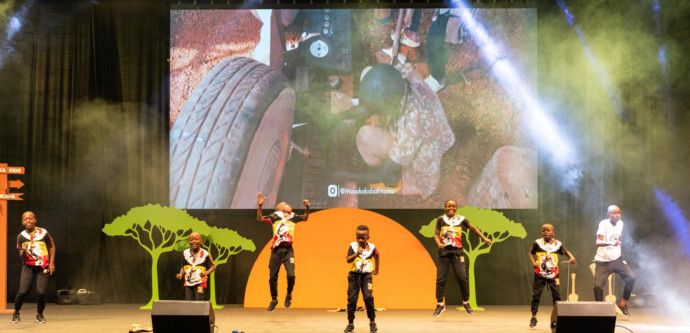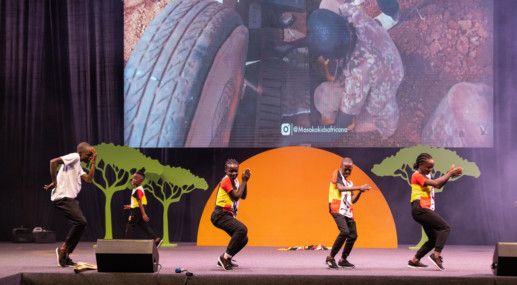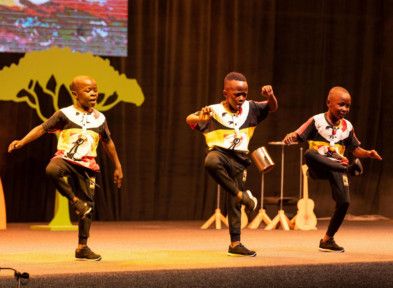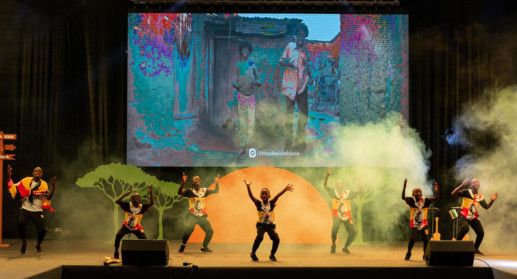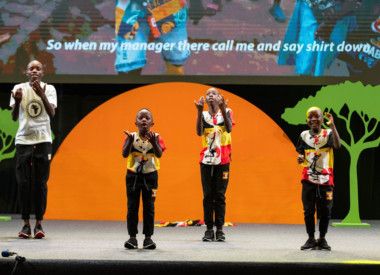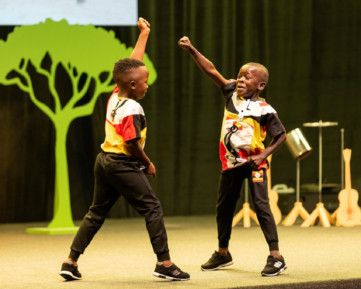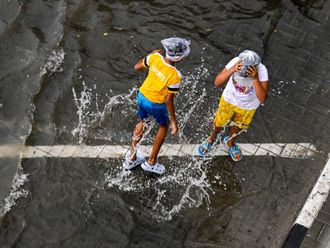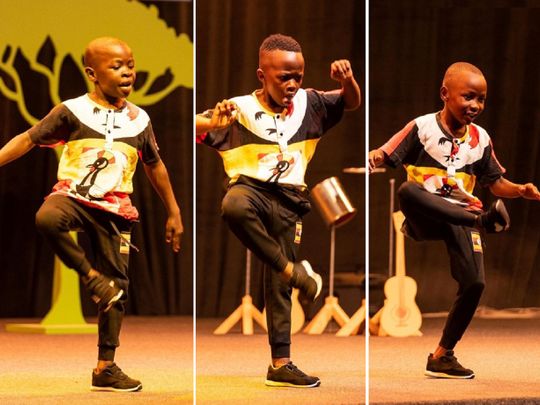
Sharjah: The stage was set at the ballroom, the lights dimmed, and the audience eagerly waited for the performance. As soon as the music started, the performers cast their spell with an electrifying energy and fluid, graceful movements, in perfect sync with the rhythm of the music.
They dance to their songs, upbeat and contagious in equal measure. And they sure captivate audiences with their unique performance.
Masaka Kids Africana, the world’s favourite group of young Ugandan artists, pulled off their first-ever performance in Sharjah with a heartwarming show on the inaugural day of the Sharjah Children’s Reading Festival (SCRF 2023).
Rhythmic dances
The Masaka Kids performed rhythmic dances, from Afrobeat, Boga, Reggae and diverse African dances and moved their feet to some iconic international and African songs.
As the performance progressed, the audience was entranced, their eyes fixed on the dancers as they moved across the stage conveying so much emotion with each step telling a story that left the audience inspired, entertained.
Huge following
The group of Ugandan children — aged 2 and above — already boast a following of 3.45 million on YouTube, 7.8 million followers on Instagram, and 5.5 million followers on TikTok.
They will continue to stage performances daily until May 7 at the SCRF 2023 premises in Expo Centre Sharjah.
The (SCRF) 2023 taking place at Expo Center Sharjah brings diverse activities from seminars, workshops, reading and learning sessions for children in particular, but suitable to different ages as well.
History, mission
In an interview with Gulf News, Suuna Hassan, the founder and CEO of Masaka Kids Africana, explains that the nonprofit is “a community-based organisation” supporting Ugandan children.
Many of the members have “lost one or both parents through the devastation of war and famine.” Hassan, who speaks in his mother tongue, the Ugandan language, which Johnny translates said:
“The organisation was established in 2013. We named it Masaka Kids Africana because it is the village where we grew up in. We want to inspire as many young generations as possible and teach them to be proud of their origins.”
The group, which started with 5 children, provides resources and services to meet the children’s foundational needs. It has since reached to 200 children, aged two and older — most have endured trauma, poverty and hardship. The organisation provides the support these children need to secure a brighter future.
From street kid to performer
Hassan expressed that he himself grew up as a “street kid,” and can, therefore, relate to the experiences of other disadvantaged children.
From his personal experience, he drew inspiration to create Masaka Kids Africana to uplift and empower children in Uganda.
The organisation’s mission is to “rescue and save children in Uganda who are starving or in need” with the aim of providing “a loving and safe environment where they can grow physically, mentally, emotionally and spiritually.”
In Africa, song and dance are forms of communication and a key part of celebrations and ceremonies. The African drum, also referred to fondly as the “heart of the community,” is the most crucial instrument as it “reflects people’s moods and emotions.”
The children dance to songs with lyrics that tell the story of “their lives, where they have come from and where they are now,” Hassan explains.
They express their emotions through original songs that the team in the organisation chooses for them to sing and dance to. The children touch the audience with their contagious smiles and vibrant dance moves, and with every performance, the children receive a standing ovation.
Goals
In addition to the 200 children under it direct care, Masaka Kids Africana also provides aid to children around and outside of the village. This aid takes the form of “food, school, clothes and other education materials, Hassan says.
One of the organisation’s long-term goals is to own a large home and help a greater number of children.
Masaka is a family that aims to helps to place orphaned, mistreated children in a loving environment. This gives them a chance to flourish and eventually be able to give back to their community and the world.
Education is critical to Masaka Kids Africana and the organisation hopes that in the future education becomes something that every child can receive regardless of their location and background.
The organisation hopes that the support children receive will one day inspire them to extend the same kind of support to others and empower the children to take up positions of leadership in their communities, as Hassan has done.
Through education, children can rise out of poverty and help Uganda as a whole to thrive economically.
With a religious foundation, the organisation aims to instil faith in the Almighty in the children — who can serve as a source of hope for the future. The children themselves engage in humanitarian work, for instance, going out and helping the homeless.
How to help
The nonprofit relies on donations and the work of volunteers to support children in Uganda. People can donate to pay for school fees and food and support children with other basic needs like medical care and clothing.
What makes Masaka Kids Africana stand out is its use of dance and song as a means of empowerment. The organisation also puts in place vocational activities so that children can learn valuable skills that will help them to one day secure jobs and start small businesses.
The group hopes to continue impacting these children’s lives and help them overcome their struggles. By providing for their basic needs, giving them access to education and uplifting them through dance and song, Masaka Kids Africana hopes to help Ugandan children break the cycle of poverty.
Hassan said: “I tell you not to give up. According to my background and even the life of these kids, it’s really, really hard to live. But I never gave up. I didn’t dream that one day I’ll be on one of these stages in Global Village and people will clap for them and could be happy to see them.
“I thank everyone for supporting us, everyone who likes the children’s performances and follows us. Following us on social media is another way of supporting us. Through social media, everyone can see our message, and everyone can see what we’re doing.
Hassan’s message to people
"Never give up. Never lose hope. Always be humble. The thing that you could not catch up today…and could not do tomorrow — but, with persistence, you can do it. Everything is possible.”
Kids dream
Eight kids are similarly dressed with smiles on their faces as they arrive Children Reading Festival at theatre of Sharjah Expo centre and started dance performance.
Gulf News met three of them.
Prince Suuna Mr Masaka, 5, said: “I want to grow up to be musician. “I like Masaka because it makes me happy…can help people. I love to sing and dance”.
Namubiru Nabirah, 13, has been with the Masaka team for nearly 10 years. “They are my family. I want be teacher to teach those who cannot go to school — and have their education.”
Kaggawa Johnbosco, 6, wants to be a lawyer when he grows up. “I learned that justice is important, and I want to help my people. All the community members work together to come up with these steps. I like Masaka it makes me happy.”
Johnny said besides the UAE, the Masaka team traveled to Turkey to perform. “This is our fourth trip to the UAE — first to Dubai Expo, Global Village, once to Abu Dhabi and this time, in Sharjah,” he said.
“We upload the children’s performances on social media to spread the message that Ugandan children or any child for that matter, who has lost a lot, still has so much potential for a bright future when they get the care they deserve,” he adds.
“The children said they were enjoying their stay in the UAE, but they missed home, especially their friends, as one could tell that they were used to performing along with them.”


